Dalanzadgad, Mongolia
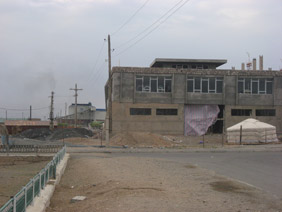 Dalanzadgad, in South Gobi Province, a provincial town in the Mongolian desert, hs been our first attempt to use the materials outside of Africa. Mongolia is a predominantly Buddhist country, with barely more than 1% Christians, and yet the Church has seen massive growth in South Gobi Province where the number of churches has risen from 4 to 23 in just 2 years. These churches are among the nomadic people of the desert, where there is very little resource to support or sustain the pastors of the new churches, and so the business training was undertaken as a way to equip those pastors with the ability to generate their own income, and be a financial asset rather than a financial burden on the church or the communities to which they are ministering. Dalanzadgad, in South Gobi Province, a provincial town in the Mongolian desert, hs been our first attempt to use the materials outside of Africa. Mongolia is a predominantly Buddhist country, with barely more than 1% Christians, and yet the Church has seen massive growth in South Gobi Province where the number of churches has risen from 4 to 23 in just 2 years. These churches are among the nomadic people of the desert, where there is very little resource to support or sustain the pastors of the new churches, and so the business training was undertaken as a way to equip those pastors with the ability to generate their own income, and be a financial asset rather than a financial burden on the church or the communities to which they are ministering.
This work was our first opportunity to test how well the materials would transfer from the African culture to the Asian culture, and also to see how a new team from the UK, self-trained in the materials, would cope with delivering them. What follows is very much a personal reflection on the journey and the key learning points we got from it. For a slightly more formal report, please feel free to visit: http://radstock.org/where-we-are/mongolia/mongolia-church-planters-in-business/
I effectively began my (what was to become a marathon) journey on the morning of Thursday 8th May from a Pittsburgh Hotel, and finally arrived at our ultimate destination on the dawn of Wednesday 14th May almost a week later - 12 time zones earlier and having spent literally 75 hours (19+32+24) in transit.
Having landed on Friday morning in the UK, we gathered the UK contingent of the team (Peter & Jacqui Mounsey, and Paul Williams) and headed off for Heathrow on Saturday. We had a 12 hour stopover in Moscow on Sunday (with everyone wanting to know whether we were supporting Chilseee) and arrived in UB (capital of Mongolia) on Monday morning. There we met the Mongolia contingent of the team (Bold, Magi, Mugi, Seke and Tsogoo) and completed final preparations for the course.
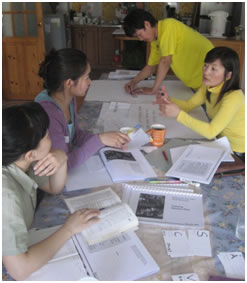 From left to right, the photo on the right shows Magi, Mugi, Tsogoo and Seke doing the final translations of the flipcharts for the course. The quality of the Mongolian team was excellent. We did not really know what to expect when we arrived, communication has always been difficult in ascertaining exactly what has been done (as it has been with Uganda) but we were hopeful that we would at least have something we could use. This was the first real training outside of the area for which the training was tailored, and the first in a non Anglicised culture where none of the participants spoke English, so we really needed something useable in the Mongolian language. What we discovered far exceeded our expectations; the workbook had not only been professionally translated, but it had all of its pictures, and tables, and had been paginated to exactly match its 'English' counterpart (we later discovered how important this would be to us in trying to find out where we were in a script we could not read). Added to which, the translators that had been selected (students from the University in UB) were first class. They were easy to understand, easy to get along with, hard working, intelligent and fun. They were also to prove to be the major factor in our success. To download a copy of the Workbook in Mongolian, please click on the link. From left to right, the photo on the right shows Magi, Mugi, Tsogoo and Seke doing the final translations of the flipcharts for the course. The quality of the Mongolian team was excellent. We did not really know what to expect when we arrived, communication has always been difficult in ascertaining exactly what has been done (as it has been with Uganda) but we were hopeful that we would at least have something we could use. This was the first real training outside of the area for which the training was tailored, and the first in a non Anglicised culture where none of the participants spoke English, so we really needed something useable in the Mongolian language. What we discovered far exceeded our expectations; the workbook had not only been professionally translated, but it had all of its pictures, and tables, and had been paginated to exactly match its 'English' counterpart (we later discovered how important this would be to us in trying to find out where we were in a script we could not read). Added to which, the translators that had been selected (students from the University in UB) were first class. They were easy to understand, easy to get along with, hard working, intelligent and fun. They were also to prove to be the major factor in our success. To download a copy of the Workbook in Mongolian, please click on the link.
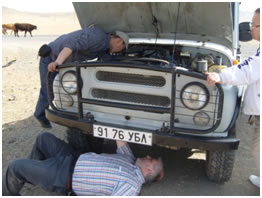 We gathered on Tuesday morning to set out for the South Gobi desert, and the town of Dalanzadgad, and met our first set-back. Tsogoo (one of our translators) had apparently become ill overnight and could not join us. But we still had three translators, and with a little reorganizing we felt that this would still work well. So we packed our vehicles, and set out at dawn, expecting to arrive by dusk. But that was without allowing for Russian engineering and Mongolian organization. Within 30 km, the Russian Jeep had broken down twice – one fan-belt and one radiator leak. Our driver, Naraa, decided to call up reinforcements to take us on the rest of the journey, but after a little debate on the reliability of the cars over 500km of desert we decided it would be best to take all three vehicles – a fortuitous choice as 6 further breakdowns that We gathered on Tuesday morning to set out for the South Gobi desert, and the town of Dalanzadgad, and met our first set-back. Tsogoo (one of our translators) had apparently become ill overnight and could not join us. But we still had three translators, and with a little reorganizing we felt that this would still work well. So we packed our vehicles, and set out at dawn, expecting to arrive by dusk. But that was without allowing for Russian engineering and Mongolian organization. Within 30 km, the Russian Jeep had broken down twice – one fan-belt and one radiator leak. Our driver, Naraa, decided to call up reinforcements to take us on the rest of the journey, but after a little debate on the reliability of the cars over 500km of desert we decided it would be best to take all three vehicles – a fortuitous choice as 6 further breakdowns that 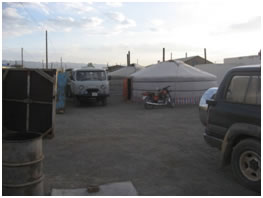 day (and night) were to demonstrate. All in all, the breakdowns, regularly losing the other cars in the desert, and getting lost altogether, cost us a further 12 hours on our trip, and we arrived, without sleep, at dawn on the Wednesday, 24 hours later. The picture on the left is where we were to sleep and eat for the next four days. day (and night) were to demonstrate. All in all, the breakdowns, regularly losing the other cars in the desert, and getting lost altogether, cost us a further 12 hours on our trip, and we arrived, without sleep, at dawn on the Wednesday, 24 hours later. The picture on the left is where we were to sleep and eat for the next four days.
It was clear that none of us was really in a fit state to begin the training at 9am as planned, and even if I had switched into Macho mode (as I am sadly prone to do on such occasions – the show must go on you know!) I would not have had a translator in a fit state to support me – so we bit the bullet, and agreed to postpone the start of training to 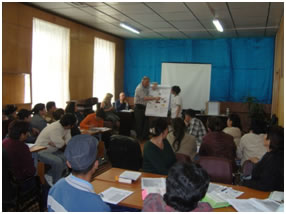 that afternoon. Choosing instead to hand out the materials for people to read through in the morning. The attendees on the course had gathered to Dalanzadgad from all around the desert, where each was in some form of church leadership amongst the nomadic desert communities, and this was their first sight of the material. that afternoon. Choosing instead to hand out the materials for people to read through in the morning. The attendees on the course had gathered to Dalanzadgad from all around the desert, where each was in some form of church leadership amongst the nomadic desert communities, and this was their first sight of the material.
At 1pm we gathered at the local college (Dalanzadgad has a population of about 15,000) and began the training. This was the first point where the quality of the translators 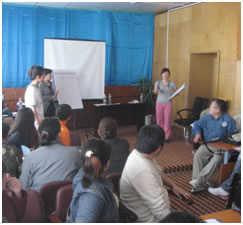 proved key. I had not realized how difficult it would be to train a group where no-one spoke English, and where I got no feedback from the group at the time I was speaking (and of course waving my arms about in my usual animated style – a behavior that Magi teased me on mercilessly). All I got was a sea of blank (and occasionally bemused) faces, and then had to wait to see whether there was any response to what the translator said to the group. Sometimes, the response was as expected, and sometimes it was not – the culture makes a big difference. But the translators were brilliant – they had read the material; they really cared about what we were doing; they were highly intelligent, professional and confident; and they carried the course through all the sticky patches – sometimes running chunks of it themselves without any intervention from the rest of us. We really were entertaining angels unaware. proved key. I had not realized how difficult it would be to train a group where no-one spoke English, and where I got no feedback from the group at the time I was speaking (and of course waving my arms about in my usual animated style – a behavior that Magi teased me on mercilessly). All I got was a sea of blank (and occasionally bemused) faces, and then had to wait to see whether there was any response to what the translator said to the group. Sometimes, the response was as expected, and sometimes it was not – the culture makes a big difference. But the translators were brilliant – they had read the material; they really cared about what we were doing; they were highly intelligent, professional and confident; and they carried the course through all the sticky patches – sometimes running chunks of it themselves without any intervention from the rest of us. We really were entertaining angels unaware.
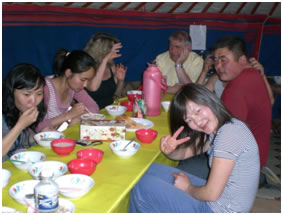 Mongolia is a hard place, the facilities there were somewhat rudimentary, and the scenery in Dalanzadgad was not exactly what you would cross half the world to see (as the picture at the top of the page demonstrates) but I have to say that it was a week of Heaven on Earth, and all because of the relationships and the people we were with. Mongolians are an incredibly tactile and affectionate people, in a way which would be easy to misunderstand in the west. There is a lot of contact, all of it entirely appropriate, but in ways we only see over here between people who are ‘intimate’. They are great fun, and could even be described as ‘Childish’ – but childish in ways that we should all be; playful in ways that we (in the West) have ‘knocked’ out of us (by criticism and disdainful looks) before our time; childish in a way which helped me to better understand what the Bible means when it says that we only enter the kingdom ‘like a Mongolia is a hard place, the facilities there were somewhat rudimentary, and the scenery in Dalanzadgad was not exactly what you would cross half the world to see (as the picture at the top of the page demonstrates) but I have to say that it was a week of Heaven on Earth, and all because of the relationships and the people we were with. Mongolians are an incredibly tactile and affectionate people, in a way which would be easy to misunderstand in the west. There is a lot of contact, all of it entirely appropriate, but in ways we only see over here between people who are ‘intimate’. They are great fun, and could even be described as ‘Childish’ – but childish in ways that we should all be; playful in ways that we (in the West) have ‘knocked’ out of us (by criticism and disdainful looks) before our time; childish in a way which helped me to better understand what the Bible means when it says that we only enter the kingdom ‘like a 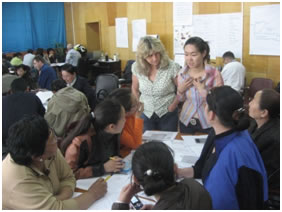 child’. I too became more childish there (although I know some of you think I did not have very far to go anyway!!!) and as a result found myself in probably the most amazing week of my ‘Adult’ existence, and forming depths of relationships that were amazing. child’. I too became more childish there (although I know some of you think I did not have very far to go anyway!!!) and as a result found myself in probably the most amazing week of my ‘Adult’ existence, and forming depths of relationships that were amazing.
The language barrier quickly demonstrated that we were right to have so many translators. Not only could they share the task of translating from the front (a difficult and draining task – and one which they did with energy and spirit) but it meant that we could help in three different areas simultaneously on a small group basis – and even then it was a struggle to keep up with the demand for help. 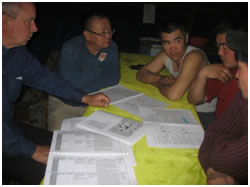 But with the occasional evening session to catch up with people (especially our drivers, Naraa and Mooco, who had to use some of each day to repair their vehicles, but very much wanted to attend the course too) it all came together just fine and the initial feedback has been very encouraging. But with the occasional evening session to catch up with people (especially our drivers, Naraa and Mooco, who had to use some of each day to repair their vehicles, but very much wanted to attend the course too) it all came together just fine and the initial feedback has been very encouraging.
While we are still awaiting the translation of the written comments, the translation of the scoring of the course can be seen in the Achievements section of the site under project to Mongolia
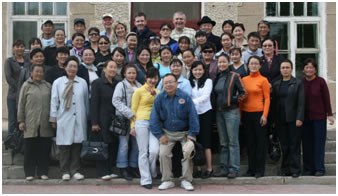 So all in all, a success, but I am sure there are things that we still need to learn (which will hopefully be reflected in the written feedback) about effectively delivering the training in the Asian culture. One vitally important aspect is respect for elders (for which I now qualify!) and this was the source of one faux pas. Right at the end of the training, Mugi asked if I could ask the group to pray about the virus which is sweeping UB and has led to all schools being closed. Owing to the need for translation anyway, and the obvious spiritual depth these girls have, I spoke to the group and then asked Mugi to lead the prayer – which she did, and very well. What I did not realize is that I had put her in an immensely difficult position of publicly choosing between dishonouring a valued guest (me) by not leading prayer or dishonouring all of her seniors (the entire rest of the room) by taking over their role in leading prayer. She chose to honour the guest, and I was oblivious to the damage I had caused until I saw her a brief while later in tears. I have to say, once I understood I was distraught myself, and found it very difficult and emotional to explain to the group how I felt about what had happened (something akin to betraying the faith and trust of your own child – which perhaps gives some sense about what I meant by depth of relationship) and although it all turned out right in the end, it does go to show how important understanding the cultural differences really is. So all in all, a success, but I am sure there are things that we still need to learn (which will hopefully be reflected in the written feedback) about effectively delivering the training in the Asian culture. One vitally important aspect is respect for elders (for which I now qualify!) and this was the source of one faux pas. Right at the end of the training, Mugi asked if I could ask the group to pray about the virus which is sweeping UB and has led to all schools being closed. Owing to the need for translation anyway, and the obvious spiritual depth these girls have, I spoke to the group and then asked Mugi to lead the prayer – which she did, and very well. What I did not realize is that I had put her in an immensely difficult position of publicly choosing between dishonouring a valued guest (me) by not leading prayer or dishonouring all of her seniors (the entire rest of the room) by taking over their role in leading prayer. She chose to honour the guest, and I was oblivious to the damage I had caused until I saw her a brief while later in tears. I have to say, once I understood I was distraught myself, and found it very difficult and emotional to explain to the group how I felt about what had happened (something akin to betraying the faith and trust of your own child – which perhaps gives some sense about what I meant by depth of relationship) and although it all turned out right in the end, it does go to show how important understanding the cultural differences really is.
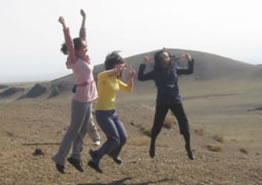 We left Dalanzadgad on the Sunday morning, exactly four glorious days after arriving, feeling appreciated, loved, successful and together. And went to see other parts of the desert, and the mountain which dominates the Dalanzadgad skyline in great spirits which even the journey home could not dampen. And it is probably best to draw a veil over getting hopelessly lost in the night and the fact that our return drive took 38 hours!!!! (including a four hour cat-nap in the cars between 1.30 and 5.30 am). But even those long hours were blessed, involving a surprise breakfast at a church on the way, an impromptu service of hymns sung in both languages simultaneously, and some wonderful singing and dancing from the girls. It was a wonderful trip, and it was the relationships which made it wonderful; relationships formed under God, which clearly and unequivocally put ‘material’ concerns in their place. Hallelujah! We left Dalanzadgad on the Sunday morning, exactly four glorious days after arriving, feeling appreciated, loved, successful and together. And went to see other parts of the desert, and the mountain which dominates the Dalanzadgad skyline in great spirits which even the journey home could not dampen. And it is probably best to draw a veil over getting hopelessly lost in the night and the fact that our return drive took 38 hours!!!! (including a four hour cat-nap in the cars between 1.30 and 5.30 am). But even those long hours were blessed, involving a surprise breakfast at a church on the way, an impromptu service of hymns sung in both languages simultaneously, and some wonderful singing and dancing from the girls. It was a wonderful trip, and it was the relationships which made it wonderful; relationships formed under God, which clearly and unequivocally put ‘material’ concerns in their place. Hallelujah!
And what of next steps? In terms of Mongolia, it will be interesting to see how God uses what has been done there – but I am hoping we can go back in a year or so, and train trainers to take it on further (including the three girls if God chooses to bless us abundantly!). In terms of Asia, there appears no reason why the material cannot be used to do the good it has been doing in Uganda, and so maybe (with a few tweaks) we are ready.
|
Fast Links
Background to our work
What we are trying to do
How you can get involved
|
